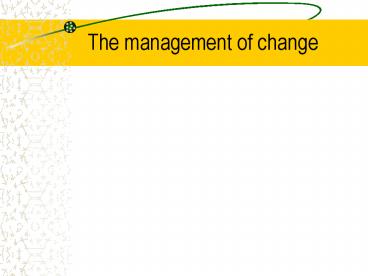The management of change - PowerPoint PPT Presentation
1 / 18
Title:
The management of change
Description:
'Change is not a sideline in business leadership, it is integral to the whole ... New telecommunication and telematics techniques. Wide variety of donors. Liabilities ... – PowerPoint PPT presentation
Number of Views:36
Avg rating:3.0/5.0
Title: The management of change
1
The management of change
2
Search questions
- What do you know about the management of change?
3
Change
- Change is not a sideline in business leadership,
it is integral to the whole idea to describe a
man who left things exactly as he found them as a
great leader would be a contradiction in terms
4
Change
- The process of change is continual and
inescapable. - To bring about change managers must adopt a style
appropriate to the situation, that is a
systematic approach - In implementing Roll Back Malaria we will be
obliged to bring about change
5
Change in malaria control
- Admitting that eradication is not possible,
perhaps not even desirable in many situations - Having to live with malaria
- Improving communication structures
- Enhancing local capacities
- Funding good quality and effective training
6
Change in malaria control
- Integrating cross sectoral activities
- Getting drugs and appropriate clinical skills to
the primary level of care - Effectively managing the partnership
- Technical coordination among partners
- Successfully negotiating new partnerships
7
The management of change
- Formal changes
- Responses to major internal forces and external
pressures. - Main external pressures are
- The economic climate and government funding
support - Technological change and new capabilities
- Government legislation
- Social needs for the future
8
The management of change
- Informal changes
- Informal changes are the responses to local
practice needs and shifts of attitude - These internal forces for change are brought
about by - Need to harmonise inter-personnel relationship in
local working environment - Personal agendas
- Managerial attitudes and style
- Strength /weakness of the formal organisation
structure
9
Objectives of change
- Numerous, may be overt and covert
- Objectives of formal process of change may be
- To break established customs, practices and
technologies to allow for innovation - To create a climate where transition from one
state to another can be accomplished - To transform some facet of an organizations way
of coping with internal and external demands
10
Key problem in making change
- How to minimize resistance by those involved
- Resistance can take many forms and ranges widely
from - Enthusiastic cooperation and support-to-
- Cooperation
- Acceptance
- Cooperation under pressure from management
- Acceptance
- Passive resignation
- Indifference
11
Key problem in making change
- Indifference
- Apathy loss of interest in the job
- Doing only what is ordered
- Passive resistance
- Regressive behaviour
- Non-learning
- Protests
- Working to rule
12
Key problem in making change
- Active resistance
- Doing as little as possible
- Slowing down
- Personal withdrawal
- Committing errors
- Spoilage
- Deliberated sabotage
13
A systematic approach to making changes
14
A systematic approach to making changes
15
A systematic approach to making changes
16
A systematic approach to making changes
17
Management balance sheet
- Building a management balance sheet is a very
useful exercise - Consider the malaria control programme in your
country - List the assets on one side and the liabilities
on the other side of a table - Draw some conclusions from the comparison
- Devise the means whereby the assets could be
increased and the liabilities reduced
18
Management balance sheet
- Assets
- High commitment(researchers and trainers)
- Cheap drugs
- Willing learners
- High quality information
- High quality training resources
- New telecommunication and telematics techniques
- Wide variety of donors
- Liabilities
- Drug resistance
- Poverty
- Lack of trained personnel
- Political corruption and /or ignorance
- Poor distribution systems
- Problems of intersectoral collaboration
- Inadequate funding
- Poorly developed health infrastructure
- Time






























![[Study Tips] APMG International Change Management Certification Exam PowerPoint PPT Presentation](https://s3.amazonaws.com/images.powershow.com/9661122.th0.jpg?_=20210915051)
